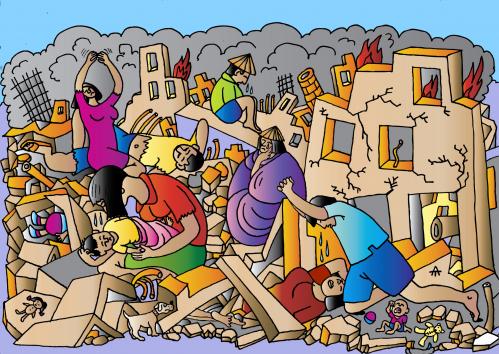DISASTER, what's that?
Can a volcano eruption, or earthquakes, or tsunami, or flood, or an airplane crash, or landslides, or a hurricane, called 'disaster'??
Haha, usually, that's what we heard from the news and et cetera. However actually, those events can't alway be called a disaster.
Why? Let's define the meaning of a 'disaster'.
Disaster is a "sudden ecological phenomenon of sufficient magnitude to require external assistence" -World Health organization [WHO]
So, an event like an earthquake with 7.0 Richter, cannot be called as a disaster if it happens in a place where nobody lives there, because there's no external assistance needed to counteract with the effects & damages caused by the earthquake. It is just an event.
 It will only be called as a disaster only if the 7.0R earthquake happened in a big city, with a big population. Imagine how many damages there would be.. How many lives would have gone with it.. How many recoveries needed to be done.. Until local people and the governor would require external assistance, then the event should be called as a DISASTER.
It will only be called as a disaster only if the 7.0R earthquake happened in a big city, with a big population. Imagine how many damages there would be.. How many lives would have gone with it.. How many recoveries needed to be done.. Until local people and the governor would require external assistance, then the event should be called as a DISASTER.Now that we understand the meaning of a disaster. Now the question is, how to cope with it? Any plans?? Imagine if suddenly a disaster occurred in your place (nauzubillahiminzalik).. What would you do? (or at least the government do..)
Okay, here's the plan...
owh, before that, let's learn a little bit about those terms...
Hazard -------- Something that contents energy, which may results something bad to happen.
Mitigation ---- Effort(s) to lessen the impact of an event.
Risk(s) -------- Probability that something negative will occur.
Preparedness - Effort(s) to increase resilience.
Event --------- Realization of hazard.
Impact -------- Contact between an event & society.
Damage ------ Negative results from the impact of an event.
Resilience ---- The 'daya tahan' in Indonesian & Malaysian language.
Capacity ------ Numbers affected from the event / needed to be protected.
Absorbing Capacity -- Capacity to absorb the power of an event (e.g. earthquake-proof buildings).
Buffering Capacity --- Capacity of reservation (e.g. keeping rice for famine preparation).
Response ------- Capability of local people to response to the after-effect of the event.
Disaster -------- Events that require external assistence.
Recovery ------- To make things back to normal (like previously).
Development -- To rebuilt, better than before.
Generally, the Disaster Management includes Prevention, Mitigation & Preparedness in PreDisaster phase, Responses in Disaster phase, and Recovery & Development in PostDisaster phase.
Knowledge is power.
and He is the Most Powerful, for He knows everything :)










